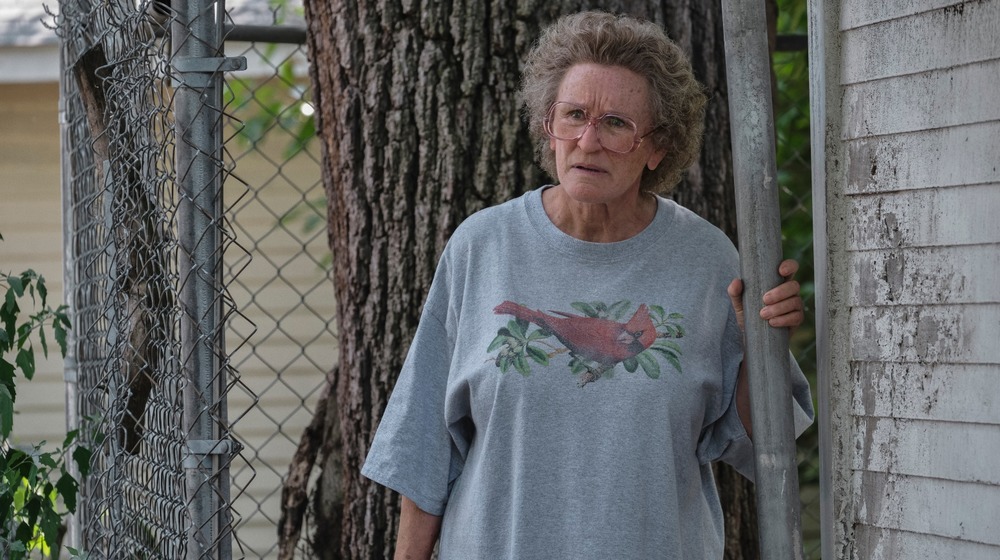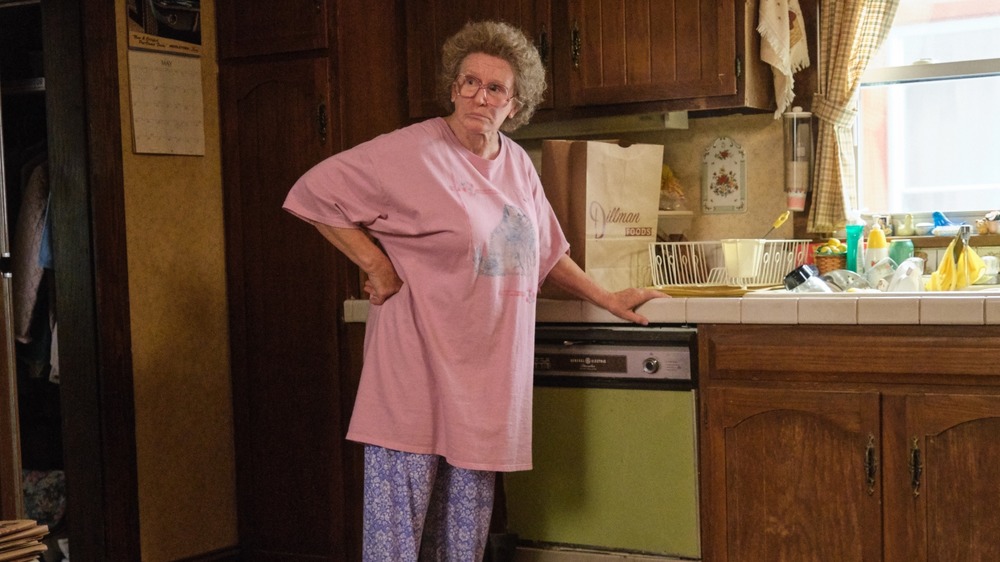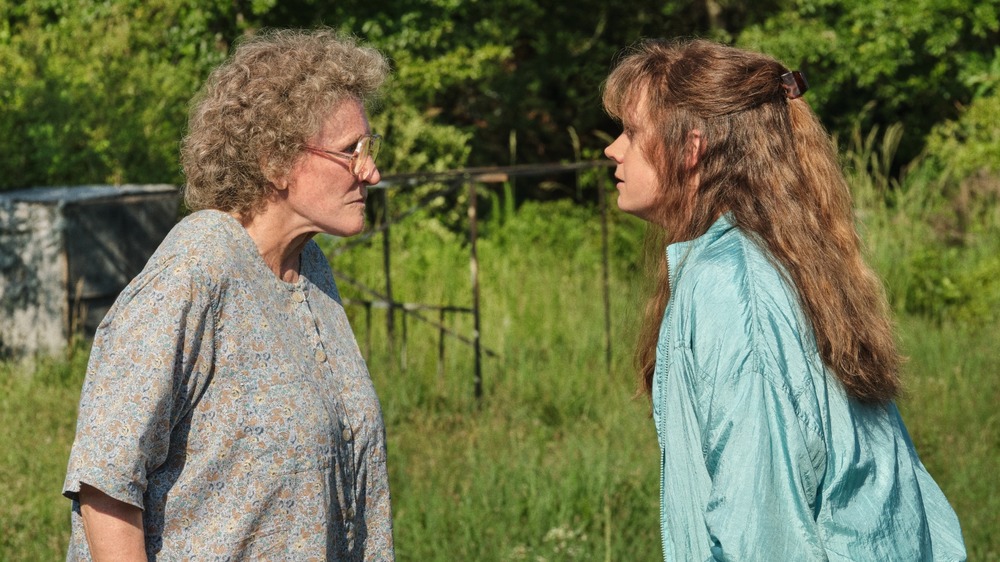The One Hillbilly Elegy Scene That Makes Us Love Glenn Close Even More
This content was paid for by Netflix and created by Looper.
Glenn Close is one of Hollywood's most accomplished stars, and she isn't slowing down any time soon. In Hillbilly Elegy, the actress stars as the sharp-tongued grandmother of a young boy with the potential to rise above his inauspicious station in life — if only he can escape the cycle of chaos and violence that has marred his childhood, that is. Close's Mamaw, who is based on the real-life woman who meant so much to attorney and author J.D. Vance, is a truly complicated character, and Close manages to present all of her flaws and contradictions and redeeming qualities with such precision that we cannot help but fall in love with her all over again.
Close is a consistent scene-stealer throughout Hillbilly Elegy — which is quite a feat, considering Amy Adams is also riveting in her role as Mamaw's daughter Bev. But there's one scene in particular that really leaves an indelible mark. In the third act of Ron Howard's biographical drama, after Mamaw is hospitalized from a fall, she begins to realize that she's the only person who can step in to help J.D. overcome his circumstances as he begins falling further onto a troubling path, and she literally springs into action. After ripping out her IV line and marching from the hospital to Bev's new home, she finally confronts her daughter over her parenting of J.D. and demands that the boy come to live with her so that he can have a chance at a better life. Not only is the scene powerful, but it also reminds us exactly why it is that Glenn Close has been such a legend of the silver screen for so many decades.
She completely disappears into the role
Throughout Hillbilly Elegy, Close's commitment to the role of Mamaw goes well beyond her visual aesthetic — although there is certainly something to be said for how much she completely embraces her wild grey mane and disheveled, frumpy costuming throughout the film. Fans of the actress would be hard pressed to recognize her in this film, as she is fully absorbed into the spirit of Mamaw in every single appearance.
This scene specifically shows just how effective Close's performance is. Mamaw has always been down on her luck, but she is in especially dire straits due to her injury. However, as we watch, she slowly gains a new source of strength and resolve from her realization that no one else is going to step in and save her grandson from himself. The process of her putting mind over matter at this critical moment is flawlessly executed by Close. And this kind of performance is right in line with what we've seen from the actress throughout her career.
The scene is reminiscent of a key moment from her latest Oscar-nominated role in the 2017 film, The Wife, in which her character Joan finally unleashes the truth about her long-simmering and long-hidden contempt for her husband. As with that story, Close's character in Hillbilly Elegy has been suppressing her true emotions for so long that when they ultimately burst from her, it completely renews her energy and fighting spirit.
She shows off her skills for both drama and comedy
Throughout her fruitful career, Close has become a cultural icon for her work in some very searing dramas, including her celebrated turn as the unhinged stalker in Fatal Attraction and as the scheming Marquise de Merteuill in Dangerous Liaisons, to name a few. However, she has also displayed a knack for light-hearted fare along the way, particularly when it comes to roles that entail a heavy makeover. There's her work as the playful villainess Cruella de Vil in the 1996 live action version of 101 Dalmations, her turn as the disconcertingly robotic Claire Wellington in The Stepford Wives, and her Academy Award-nominated performances in comedies like The World According to Garp and The Big Chill. Overall, Close is known for making fans smile just as often as they cry.
That is certainly true of this key scene from Hillbilly Elegy. Not only do we see her emboldened and ready to put her foot down about Bev's mistreatment of J.D., but she keeps her funny bone on full display throughout the powerful confrontation. In one moment, for example, as she barges into J.D.'s room and finds him smoking marijuana with his new stepbrother, she deadpans, "Oh, I don't give a rat fart what you're smoking kid. If you think you're hiding it honey, you're dumb as a bag of hair." Shortly after that, she responds to her own daughter calling her crazy with a quaint grin and an air of humor as she prompts J.D. to start packing his bags because they've finally won this battle. This gin-playing, Terminator-quoting grandma certainly has her own version of a good time, and she also knows just how to shrug off her biggest critics.
She can be both tough and vulnerable at the very same time
Another reason this scene from Hillbilly Elegy is so striking? It's the way that Close nimbly presents both the strength and weaknesses of Mamaw in equal measure. In the hospital, Mamaw is feeble and seemingly defeated both inside and out. But once she puts her mind to it, she gathers up her faculties and gets to the business of saving J.D. It's not just the physical manifestation here that shows the duality of the character, though.
If you watch the scene closely, you might notice that Mamaw also initially continues to struggle with her own inner conflict about her daughter Bev. Sure, she storms into the house on a mission to spring J.D. from the place, but she also bites her tongue and avoids immediately responding to Bev's shouted questions about why she's dropping in out of the blue. That hesitation and visible frustration might only last just a few seconds, but it exemplifies exactly what Mamaw has struggled with throughout the entire story of Hillbilly Elegy; she quietly stood by throughout so much of Bev's turmoil and abuse of J.D. and knows that she is at least partly responsible for enabling her daughter's worst impulses and behaviors.
So it takes her a while to decide to hold her accountable and declare that enough is enough. But once she does commit to finally admonishing Bev and stepping up for J.D., it's clear that Mamaw finally feels free in her own right. In the end, Mamaw continues to have her own problems and faults, but she finally realizes that she can't wait for her own life to get better before she takes action and owns up to her responsibility to J.D., his sister, and, in a way, Bev as well.


